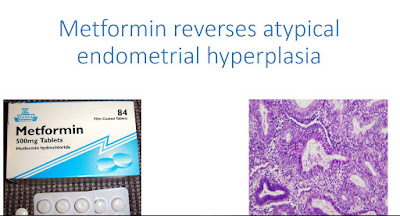Adjunct metformin treatment help reversal of atypical endometrial hyperplasia (AEH) and improves overall survival in endometrial cancer reports the result of a systematic review and meta-analysis published ahead of print in Journal of Gynecologic Oncology.
Metformin is
named as ‘Magic Bullet’ by some researchers because of its new-found role in
reversing aging to improving survival in many cancers, besides being in use as
antidiabetic and cardioprotective drug since nearly 60 years.
Metformin was
introduced for use as antidiabetic in UK in 1958.
Endometrial
cancer (EC) is one of the most common gynecological cancer. The American Cancer
Society estimates that about 61,380 new cases of EC of the uterus (uterine body
or corpus) will be diagnosed in 2017 and about 10,920 women will succumb to the
disease.
This
systematic review and meta-analysis searched Cochrane, LILACS, PubMed, Scopus
and Web of Science in January 2017 and included 19 eligible studies that
included information about reversal of atypical endometrial hyperplasia,
cellular proliferation biomarkers expression and overall survival in
metformin-users compared to non-users.
In 5
studies, metformin led to reversion of AEH to a normal histology and decreased
cell proliferation biomarkers staining, from 51.94% to 34.47%.
Patients on
adjunct metformin had 18% increased odds of survival as compared to patients
who were not diabetic and not on metformin. (HR = 0.82; CI: 0.70–0.95;
p = 0.09, I2 = 40%).
Type 2
diabetes mellitus and insulin resistance is involved in the etiology of
endometrial cancer (EC), so metformin may have both direct and indirect effect on
tumor regression.
There was
considerable heterogenicity observed between the studies but, despite that metformin was shown to be beneficial in reversal of AEH and improving overall survival in
EC.
The authors
call upon future need of prospective
trials regarding the anticancer effect of metformin and improving the clinical
outcomes in EC.
Primary
source: Effects of metformin on
endometrial cancer: Systematic review and meta-analysis
Meireles, Cinthia G. et al.
Gynecologic Oncology , Volume 0 , Issue 0 ,

Q.1.How exactly the metformin acts at endometrial level? What is the phramacodynamics involving control cell proliferation at endometrial level-apoptosis?
ReplyDeleteQ2. Is control of abnormal proliferation is - anyway related to reduce peripheral blood glucose-lowering effect induced by ingested metformin? If that is so, then can we infer that hyperglycemia itself induces hyperplasia?
Q.3. is endometrial tissue / fluid glucose level is correlated with peripheral drum gl of the woman concern?? In many of such woman at this age of > 45 yrs do have some mild renal impairment. Should we at all use the drug which is excreted by Kidneys just to check the progression of hyperplasia to neoplasia?
Q. 4. Balancing the risk & benefit:-What % of Indian women with simple / complex hyperplasia with or without atypia will / may change to form hyperplasia to frank Ca- if left untreated-i.e. No metformin, no progesterone orally /Mirena?? : From drsrimantapal mail.com
Z the endometrial atypia in Pcos n otherwise hav same response to metformin?
ReplyDeleteZ the endometrial atypia in Pcos n otherwise hav same response to metformin?
ReplyDeleteThanks for your information. Please accept my comments to still connect with your blog. And we can exchange backlinks if you need. What Is Endometrial Cancer?
ReplyDeleteI found out, that taking herbal treatment is the best to get rid of hpv as soon as i feel the symptoms of hpv is appearing, i took the healing process by contacting Dr onokun for natural treatment it works wonders, amazingly ever since I had the herbal treatment i have not feel these horrible disease anymore and my doc told me the virus is gone, i am glad i finally got cured out from this horrible disease. every hpv or herpes patients should also get in touch with this herbalist Dr to get ride of these disease forever his email address; dronokunherbalcure@gmail.com
ReplyDelete